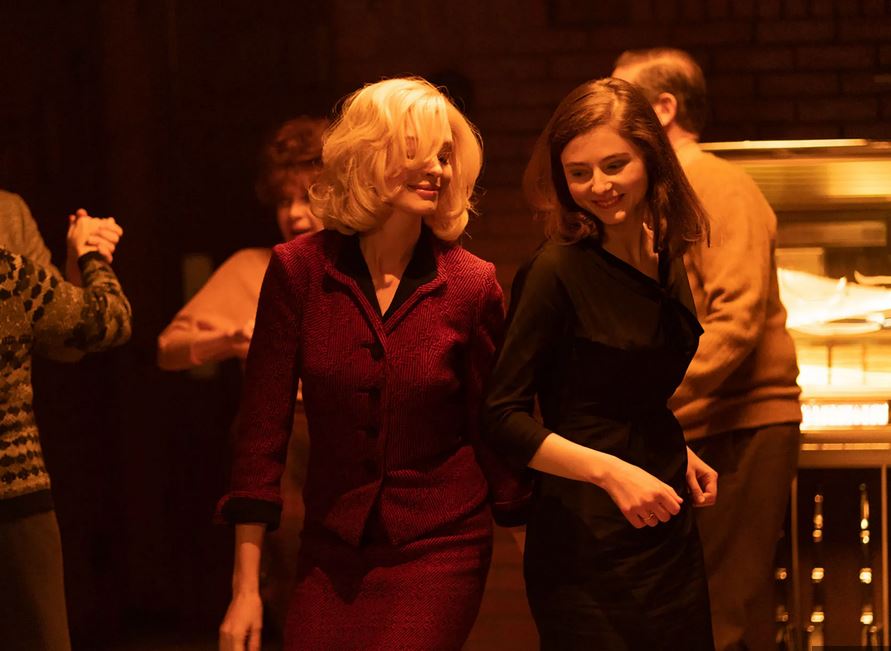
One of the rewards of watching Eileen, directed with a pitch-perfect noir sensibility by William Oldroyd (Lady Macbeth) and presented by Neon, is embracing the unknown. Are we watching a prison break film with an unlikely accomplice? A repressed lesbian love story set in the 1960s? Or is it a violent revenge fantasy fueled by childhood trauma? Eileen‘s story moves forward and builds tension and suspense from these genre-bending elements.
Eileen is a starring role requiring daring, nuance, and depth—all embodied by Thomasin McKenzie, who specializes in films with alternate worlds (Old, Jojo Rabbit, Last Night in Soho). In rapid order, we learn that Eileen’s life is one endless tale of sexual frustration, workplace claustrophobia, and familial abuse. McKenzie is perfectly cast as a girl-child trapped in the body and mind of a twenty-something. She’s not yet capable of navigating the onslaught of feelings, fears, and her intrusive, abusive, alcoholic father. Surrounding Eileen are weapons in the form of the in-your-face-carbon-spewing car she drives (seen in the very first frame of the movie) to a handgun her Dad wields with nonchalant menace at her and anyone he pleases during daily intoxicated rants.
Eileen is a period drama set in the early 1960s in a small, unnamed, generic Massachusetts town during a bone-chilling New England winter—a perfect metaphor for Eileen’s circumstances. With the entrance of the new prison psychologist, Rebecca, a wisp of Spring emerges. Played with glamour and confident blonde-bombshell energy, Anne Hathaway‘s beatific presence lights up the dark found in every frame of this film. As Rebecca, she delivers to Eileen the promise of friendship (or more?) and a break from the monotony and anxieties of her day-to-day.
Ottessa Moshfegh and Luke Goebel’s adaptation of Moshfegh’s novel of the same name initially unfolds as a series of predictable episodes. Every scene with Eileen’s father, Jim, an ex-cop who is drinking himself to death while mourning the wife he abused, is a masterclass of on-the-nose writing. Shea Whigham (last seen in HBO’s Perry Mason and Starz’s Gaslit as G. Gordon Liddy) is a talented veteran character actor who, as the Dad, is given lines as simple as “Eileen, you’re a loser.” It seems clear where Eileen and Jim are headed. As Eileen’s “savior,” Rebecca’s (Hathaway) character is drawn almost too perfectly as “easy on the eyes,” with a degree from Harvard (not Radcliffe), sporting a satisfying taste for martinis, and a wicked left hook when men intrude at a bar.
However, under Oldroyd’s direction, McKenzie and Hathaway’s performances elevate the film, carrying the audience through this labyrinth of emotions and motivations. As the movie progresses, the relationship between Eileen and Rebecca takes unexpected turns, defying initial assumptions. Their bond becomes increasingly complex, and you begin to forgive (or forget) some clunky dialogue and the unrelenting oppressiveness of the people and places in this small town. Their performance does a masterful job of injecting ambiguity into the nature of their bond. The film’s gritty realism is punctuated by moments of absurdist humor, as Eileen’s fantasies of murdering her father intertwine with her waking life. These surreal sequences add an unsettling edge to the narrative, blurring what is real and imagined.
Eileen concludes with a twist worthy of investing in the inchoate dreams of these sad characters. Thomasin McKenzie, as Eileen, makes the final shocker believable and emotionally riveting. She captures Eileen’s vulnerability, desperation, and yearning for escape with heartbreaking authenticity. But, alongside this third-act twist is a healthy dose of mystery. How much of what we witnessed is one long fantasy or the inevitable intrusion of reality? There’s pleasure and power in knowing and experiencing these unknowns. Eileen lives in a dark world that seeks to live in the light. Your go-to winter movie list just got brighter.
